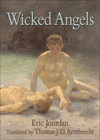Review by Hayden Thorne
BOOK DESCRIPTION:
This is the classic French literary novel, banned for 30 years, now translated for the English market. Wicked Angels is the English translation of the classic 1955 French literary novel Les Mauvais Anges, banned for 30 years for what was called its ‘subversive’ subject matter. It is the story of Pierre and Gerard, two teenagers who share a love that no one else around them can condone. The two young men discover their destiny in each other’s arms, their passion coupled with violence – and ultimately pay the price.
Translator Thomas Armbrecht helpfully includes an informative introduction that puts the novel into the proper context of the times.
REVIEW:
Anyone interested in devouring Jourdan’s novel is well-advised to read Thomas J.D. Armbrecht’s introduction. Here, Armbrecht explains in great detail the circumstances behind the novel’s censorship when it was first published in 1955 – France’s censorship law, The Book Board (La Commission du Livre), and the novel’s literary predecessors in light of past obscenity laws. It wasn’t just about obscenity, Armbrecht claims, but also the attitude of defiance against the status quo that the two boys give voice to again and again. In the introduction’s second half, Armbrecht analyzes Jourdan’s narrative style, making several references to the book’s level of graphic sexuality and violence (treat this part of the introduction as a warning).
Jourdan’s novel is sexually graphic (though not by today’s standards), and, yes, it becomes quite violent as the story progresses. The book is divided into two parts, each recounting the process of adolescent passion that eventually spirals out of control from both boys’ perspectives. Pierre’s POV shapes the first half, Gerard’s, the second. The plot itself isn’t very complicated. Simply put, it explores the development of a love between two boys who happen to be cousins. There are other characters involved, such as the boys’ fathers and their neighbors, but their roles tend to remain in the periphery though in their neighbors’ case, some forward movement does take place – and along sexual lines. By and large, these side characters aren’t that deeply explored, but that doesn’t hurt the plot at all.
Much of the action isn’t only sexual, but internal. Jourdan takes us deep inside each boy’s head, and we see the initial blossoming of an attraction between them that gradually takes on more physical expressions till the boys, swept up in their love for each other, turn to sadomasochism and violence.
The power of the novel lies largely in Jourdan’s lyricism. While the plot itself moves at a fairly slow rate, given the characters’ alternating descriptions of scenes, events, feelings, and thoughts, Jourdan manages to sustain a certain fevered level throughout the book. Whether or not Pierre and Gerard are making love or simply enjoying a luxurious moment in the sun, coming to blows with their neighbors or surveying their environment at home, I sense a tension that rises and ebbs with every scene but never goes away. Perhaps it’s Jourdan’s lush descriptions, which suffuse each scene with a sensuality that’s sometimes raw, sometimes muted and elegant. Perhaps it’s the simmering passion between Pierre and Gerard, which reaches its boiling point without a pause in the process. Of course, I prefer to see it as the combination of both.
That said, Jourdan’s descriptions also tend to be overwhelming because of their relentlessness (for lack of a better term), at times giving me reason to wonder if I’ve read the same passages in an earlier scene. If I had less patience, I’d probably get tired of the repeated lusting and panting between the characters.
Though there are several idyllic, romantic moments throughout the novel, Wicked Angels isn’t a happily-ever-after story. The voluptuousness of summer and the beach, two teenagers in love, determination and subversion under repressive society’s nose – the novel has all the elements of Romeo and Juliet, and it explores both cause and effect in beautiful and disturbing detail till the inevitable conclusion is reached. That same conclusion comes hurtling toward the reader in the style of high romance, with fevered passion, angry fatalism, and defiance – not much different from any other given moment in Pierre and Gerard’s romance but with more dreadful consequences.
The book is by no means for everyone. Jourdan is just as detailed in his descriptions of tender adolescent love as he is in his descriptions of sadomachism (beatings and blood). He holds nothing back in expressions violence and affection, and the effect is poetic and uncomfortable. The book’s horrible beauty, the fascinating cultural and historical context of its publication, and its resulting censorship make this a significant title in gay literature.
Buy the book: Amazon, Amazon UK
Filed under: 1950's, 4 stars, Essential Reads, Fiction |









Wow! A friend of mine read this recently and advised me -immediately!- that I would love it. There are so many books I want to buy, that I am very careful in what I do buy, so I checked out a few reviews, along with my friend’s original enthusiastic and colourful review adn recommendation.
I found your review and just wanted to thank you for posting such a well thought out opinion. I shall pick it up! I’ve decided. It sounds brilliant.
This book is so beautifully written, my sister found a copy of it on the side of the road and brought it to me to read. OH MY GOD. The way in which it was translated is absolutely delicious. The story itself is interesting and though it is short I couldn’t stop reading. You read it and you’re in for something you won’t soon forget.